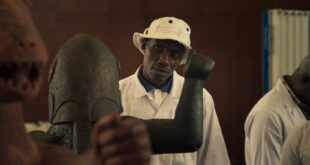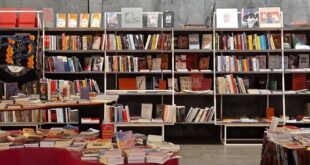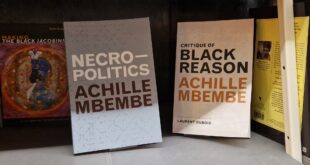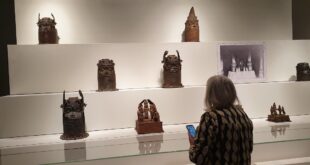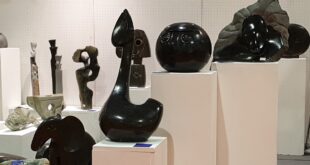Oba Ewuare II, the Oba of Benin, has appealed to the British Government to return the artefacts carted away from the kingdom by the British during the Benin invasion of 1897, saying that the artefacts belong to the Benin Museum. The Oba made the demand when the British Deputy High Commissioner, Laura Beavfils, paid him a courtesy visit in his palace in Benin City on Tuesday.
The issue of the artefacts, many of which are exhibited or warehoused at the British Museum in London, has been raging since Nigeria’s independence in 1960.
The priceless artworks were seized by the British during a punitive expedition by its forces in 1897. The military action led by Admiral Harry Rawson was in response to the defeat by the Bini people of a previous British-led invasion force, which had left all but two men dead. Rawson’s troops captured, burned, and looted Benin City, bringing to an end the West African Kingdom of Benin. As a result, much of the country’s art, including the Benin Bronzes, were looted and relocated to Britain.
Responding, Ms Beavfils did not give an answer to the Oba’s request, saying her delegation’s purpose of visiting the monarch was to strengthen trade ties and co-operation on migration matters with Edo State, whose capital is Benin City.
“We are particularly here to provide support to the state government in the fight against human trafficking, because it is of great concern to us. Over 33 million pounds have been set aside by our home government to prosecute the fight against human trafficking and for providing support to victims,” she added. According to her, over 5 million pounds would be spent in Nigeria, adding, “we will need your support in ensuring that we succeed.”
In the 19th century, disputes over trade led to strain between Benin and its chief trading partner, Great Britain. This escalated as the European powers moved to divide Africa into colonial territories. The situation culminated in 1897, when a large delegation led by Britain’s Acting Consul-General in the region, James Phillips, set off for Benin City despite requests from Oba Ovonramwen (enthroned c. 1888) to postpone their visit.
On 12 January 1897, the British delegation was ambushed by an Edo force that by all accounts acted without the Oba’s knowledge. Almost the entire party was killed, including Phillips. In quick order, a large British military force was assembled, and on 18 February 1897, they arrived in Benin City under orders to invade and conquer it. In time they captured Oba Ovonramwen and sent him into exile to Calabar, a town east of Benin.
The defeat of the Benin Kingdom completed the British colonization of Southern Nigeria.
Objects, including thousands of bronze and ivory works, within the royal palaces were now the spoils of war, many of which were sold to defray the costs of the invasion. Others were shared among members of the expeditionary force. Still others left Benin in the confusion that followed the devastation of the kingdom. Eventually works from Benin became scattered in museums across Europe and the United States.
Prior to the British invasion and defeat of Benin it was an independent kingdom that had been ruled by a long line of kings first known as Ogisos and later Obas. It was one of the most developed kingdoms of the West African coastal hinterland.
Benin was well known for her strength as a warrior nation. According to Dutch historian Olfert Dapper, as much as 20,000 men could be made ready for war in one day and if need be, 180,000. Benin also thrived in trade and amazing works of art.
Benin people since the 1960s have been clamouring for the return of the plundered works of art, especially those held by public museums in the West, with no success.
Austin Ohaegbu
 THE AFRICAN COURIER. Reporting Africa and its Diaspora! The African Courier is an international magazine published in Germany to report on Africa and the Diaspora African experience. The first issue of the bimonthly magazine appeared on the newsstands on 15 February 1998. The African Courier is a communication forum for European-African political, economic and cultural exchanges, and a voice for Africa in Europe.
THE AFRICAN COURIER. Reporting Africa and its Diaspora! The African Courier is an international magazine published in Germany to report on Africa and the Diaspora African experience. The first issue of the bimonthly magazine appeared on the newsstands on 15 February 1998. The African Courier is a communication forum for European-African political, economic and cultural exchanges, and a voice for Africa in Europe.





